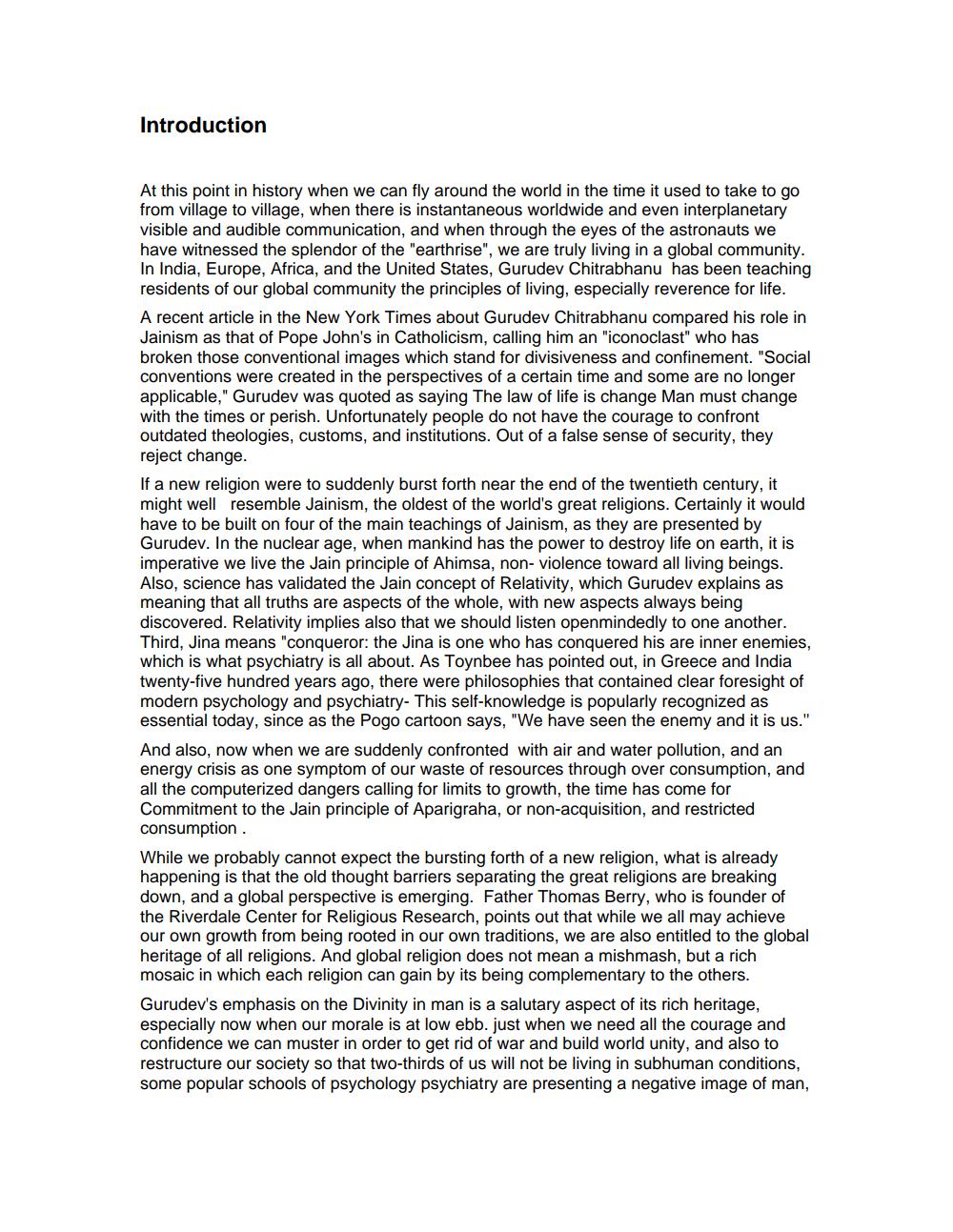Book Title: Ten Days Journey Into The Self Author(s): Chitrabhanu Publisher: Jain Meditation International Centre View full book textPage 4
________________ Introduction At this point in history when we can fly around the world in the time it used to take to go from village to village, when there is instantaneous worldwide and even interplanetary visible and audible communication, and when through the eyes of the astronauts we have witnessed the splendor of the "earthrise", we are truly living in a global community. In India, Europe, Africa, and the United States, Gurudev Chitrabhanu has been teaching residents of our global community the principles of living, especially reverence for life. A recent article in the New York Times about Gurudev Chitrabhanu compared his role in Jainism as that of Pope John's in Catholicism, calling him an "iconoclast" who has broken those conventional images which stand for divisiveness and confinement. "Social conventions were created in the perspectives of a certain time and some are no longer applicable," Gurudev was quoted as saying The law of life is change Man must change with the times or perish. Unfortunately people do not have the courage to confront outdated theologies, customs, and institutions. Out of a false sense of security, they reject change. If a new religion were to suddenly burst forth near the end of the twentieth century, it might well resemble Jainism, the oldest of the world's great religions. Certainly it would have to be built on four of the main teachings of Jainism, as they are presented by Gurudev. In the nuclear age, when mankind has the power to destroy life on earth, it is imperative we live the Jain principle of Ahimsa, non-violence toward all living beings. Also, science has validated the Jain concept of Relativity, which Gurudev explains as meaning that all truths are aspects of the whole, with new aspects always being discovered. Relativity implies also that we should listen openmindedly to one another. Third, Jina means "conqueror: the Jina is one who has conquered his are inner enemies, which is what psychiatry is all about. As Toynbee has pointed out, in Greece and India twenty-five hundred years ago, there were philosophies that contained clear foresight of modern psychology and psychiatry. This self-knowledge is popularly recognized as essential today, since as the Pogo cartoon says, "We have seen the enemy and it is us." And also, now when we are suddenly confronted with air and water pollution, and an energy crisis as one symptom of our waste of resources through over consumption, and all the computerized dangers calling for limits to growth, the time has come for Commitment to the Jain principle of Aparigraha, or non-acquisition, and restricted consumption. While we probably cannot expect the bursting forth of a new religion, what is already happening is that the old thought barriers separating the great religions are breaking down, and a global perspective is emerging. Father Thomas Berry, who is founder of the Riverdale Center for Religious Research, points out that while we all may achieve our own growth from being rooted in our own traditions, we are also entitled to the global heritage of all religions. And global religion does not mean a mishmash, but a rich mosaic in which each religion can gain by its being complementary to the others. Gurudev's emphasis on the Divinity in man is a salutary aspect of its rich heritage, especially now when our morale is at low ebb. just when we need all the courage and confidence we can muster in order to get rid of war and build world unity, and also to restructure our society so that two-thirds of us will not be living in subhuman conditions, some popular schools of psychology psychiatry are presenting a negative image of man,Page Navigation
1 2 3 4 5 6 7 8 9 10 11 12 13 14 15 16 17 18 19 20 21 22 23 24 25 26 27 28 29 30 31 32 33 34 35 36 37 38 39 40
